Carl E. Olson's Blog, page 188
October 29, 2012
New: "To Save a Thousand Souls: A Guide for Discerning a Vocation to Diocesan Priesthood"
Now available through Ignatius Press:
To Save a Thousand Souls: A Guide for Discerning a Vocation to Diocesan Priesthood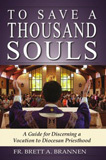
by Rev. Brett Brannen
To Save a Thousand Souls: A Guide for Discerning a Vocation to Diocesan Priesthood
is the definitive guide for men considering the priesthood. Using
powerful and entertaining stories, the book explains in down-to-earth
language how to carefully discover God's call.
To Save a Thousand Souls has been bulk-ordered by over 100 U.S.
dioceses, and has become the standard "catechism for discernment"
throughout the country. It has been re-printed in Europe and Asia and
translated into Spanish.
Readers are enthusiastic in their praise for To Save a Thousand Souls,
saying it is easy to read and answers almost all their questions about
discerning their vocation. Many young men who have read the book have
gone on to enter seminary.
"Fr. Brannen's book is tremendous-inspirational, imminently practical,
and amazingly comprehensive. It is a clearly written "how to" manual
filled with solid advice for men discerning the priesthood. A marvelous
work of immense value."
- Fr. Len Plazewski, Past President of the National Conference of Diocesan Vocation Directors
"This is an outstanding book, specifically for diocesan priests and
those concerned with their work and spirituality. A really needed book
in this Year for Priests."
- Fr. Benedict J. Groeschel, C.F.R.
"This is the best book-length treatment of discerning a priestly
vocation I've seen. In particular, Fr. Brannen's treatment of celibacy
is balanced and comprehensive. The book portrays the priesthood
honestly and attractively, clearly expressing that faithfully living an
authentic priestly vocation is an exhilarating, fulfilling, and joyful
life."
- Most Rev. William E. Lori, Archdiocese of Baltimore
"I compliment Fr. Brannen for this breakthrough work. I enjoyed the
book's conversational style and anecdotal stories, and I am especially
impressed by the chapter on celibacy and chastity, which achieves
remarkable clarity on difficult issues of discernment. It is a clear,
helpful, and down-to-earth book which will prove exceptionally useful
for men looking for answers about the priesthood, as well as those
assisting them in discernment."
- Most Rev. John J. Myers, Archdiocese of Newark, NJ
"During my many years of work with diocesan seminarians and priests I
have not come across anything that would be as helpful as this thorough
handbook. It is an amazing labor of love for the Church. I commend Fr.
Brannen for his prayerful insights as he gently explains the
discernment process with love and humor."
- Fr. John Horn, S.J., Rector of Kenrick-Glennon Seminary, St. Louis
"A treasure chest for bishops, vocation directors and those discerning a vocation to diocesan priesthood."
- J. Kevin Boland; Bishop Emeritus of Savannah, GA
"Fr. Brett Brannen is the perfect priest to write this book. His
wisdom, knowledge, and obvious passion for priestly formation shine
through on every page."
- Fr. Luke Ballman, Past Vocation Director for the Archdiocese of Atlanta, GA
"This book is anointed. It's both inspiring and informative, and will
be a tremendous help for men who are hesitant about priesthood and need
practical advice. I know I will order copies for every man in my diocese
who is discerning."
- Fr. Tim McKeown, Vice-Rector of the North American College, Rome
" This book is a real Godsend. There is simply nothing else like it in
print. It will certainly be one of the most useful tools at a Vocation
Director's disposal when encouraging young men to consider the
priesthood. It is clear, convincing, and candid. The many stories
throughout the book are inspiring and very much to the point. Not only
do I wish that I had this available when I was a Vocation Director, I
wish that it had been available to me as a young man considering a
vocation to the priesthood. It would have answered so many of my
questions. All those involved in priestly vocation work owe Fr. Brannen
a debt of gratitude."
- Msgr. Steven P. Rohlfs, Rector, Mount St. Mary's Seminary, Emmitsburg, MD
"An unparalleled resource that covers everything men need to know when
praying about their vocation. It will be required reading for my men."
- Msgr. Rob Panke, President of the National Conference of Diocesan Vocation Directors
"To Save a Thousand Souls is a feast of information. Its
detailed exposition is the most complete I have ever seen. It will help
many men to come to a clear knowledge of priesthood and seminary. Fr.
Brannen's hard work is evident in the text; it is a labor of love."
- Deacon James Keating, Ph.D., Director of Theological Formation, Institute for Priestly Formation
Preaching to the Whole Person: Classical Wisdom for the New Evangelization
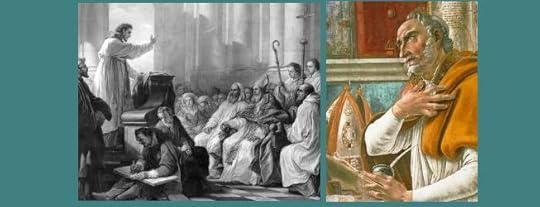
Preaching to the Whole Person: Classical Wisdom for the New Evangelization | Fr. Michael Dominic O'Connor, OP | Homiletic & Pastoral Review
St. Augustine was convinced the pagan rhetorical tradition had great insights to offer Christian preachers about the art of good preaching.
“Given the importance of the word of God, the quality of homilies needs to be improved.” 1 Pope Benedict XVI wrote these words in his 2007 Apostolic Exhortation, Sacramentum Caritatis. The Holy Father then repeated this admonition in his 2010 Apostolic Exhortation, Verbum Domini, adding: “The art of good preaching…is an art that needs to be cultivated.” 2
This need is all the more pressing as the Church embraces the call and
challenge of the New Evangelization. A renewed effort on the part of
preachers—to improve the quality of homilies, and to cultivate the art
of good preaching—must be central to the work of the New
Evangelization. The question is: How is this to be done? How can the
art of good preaching be learned and cultivated? This is an age-old
question, and there are some age-old answers to this question which, I
believe, can serve preachers very well in meeting the challenges of
evangelization in our day.
St. Augustine is the Church’s foremost teacher in the classical art
of Christian preaching, and it is to him that we will turn in order to
learn something of the classical wisdom on preaching effectively. This
master rhetorician, and former teacher of oratory, was convinced that
the pagan rhetorical tradition, which was so important to the ancient
cultures of Greece and Rome, had great insights to offer Christian
preachers about the art of good preaching. 3
We shall explore Augustine’s appropriation of this classical
wisdom—first, in his own theory of preaching, and then, in his actual
practice—with the hope of discovering that the perennial wisdom
contained in Augustine’s theory and practice of preaching can provide a
firm foundation for the work of the New Evangelization.
Augustine’s Theory of Preaching
Augustine wrote a treatise on Christian oratory called: De doctrina christiana (On Christian Doctrine), applying what he had learned as a rhetorician to the task of preaching Christian doctrine. 4
His objectives in writing this work were simple: first, to teach
bishops (preachers) how to attain an understanding of the meaning of
scripture (Books 1-3); and second, to teach them how to communicate what
they have learned (Book 4). 5 His theory of preaching is laid out very clearly in the fourth book of this treatise.
October 27, 2012
The Road of Gathering, Exodus, and Salvation.
Readings:
• Jer 31:7-9
• Ps 126:1-2, 2-3, 4-5, 6
• Heb 5:1-6
• Mk 10:46-52
“In the beginning,” states Lumen Gentium,
the Second Vatican Council’s Dogmatic Constitution on the Church, “God made
human nature one and decreed that all His children, scattered as they were,
would finally be gathered together as one” (par. 13). God’s plan of salvation
involves being liberated from sin and death. It also involves being liberated
from that place to this place, of being moved from one state in life to a
radically new one.
The prophet Jeremiah, writing during the Assyrian exile, which began around 740
B.C., pointed toward a time when the faithful return to the Promised Land and
the Temple. “Behold, I will bring them back from the land of the north,” the
Lord declared through the suffering prophet, “I will gather them from the ends
of the world, with the blind and the lame in their midst…” This is one of many
Old Testament passages describing such a gathering. Today’s Psalm expresses the
hopeful expectation of exodus from exile, “when the Lord brought back the
captives of Zion.”
Israel’s history was deeply shaped by captivity, exile and
exodus. The Exodus from Egypt was a formative event for the Jewish people. Most
first-century Jews believed that the Messiah, the “anointed one,” would gather
together the scattered people of God. Those who heard Jesus announcing the
Kingdom of God heard the promise of a renewed Davidic kingdom marked by
political and cultural autonomy.
But, as Lumen Gentium
explains, the focus of the Messiah’s regathering was not national boundaries
and political power. “It was for this purpose that God sent His Son, whom He
appointed heir of all things, that he might be teacher, king and priest of all,
the head of the new and universal people of the sons of God” (par. 13). Jesus,
the heir of David, would conquer sin and death. Jesus, the high priest, would
sacrifice himself for the sake of the world. The entire world was in exile in
the realm of sin, and the Messiah—who was also a new Moses—would lead the
people of God in an exodus from the darkness of spiritual slavery into the
light of salvation.
Jesus, in announcing the Kingdom of God, notes Fr. Robert
Barron in The Priority of Christ (Brazos Press, 2007), “was not calling attention to general,
timeless spiritual truths, nor was he urging people to make a decision for God;
he was telling his listeners that Yahweh was actively gathering the people of
Israel and, indirectly, all people into a new salvific order, and he was
insisting that his hearers conform themselves to the new state of affairs.” The
son of David was gathering the lost, the wounded, the lame, and the blind, and
he continues to gather them into the Church, which is “God's reaction to the chaos
provoked by sin” (Catechism of the
Catholic Church, 761).
The encounter between Jesus and the blind man, heard in
today’s Gospel, is a microcosm of this gathering. It took place on the cusp of
the Passover, as Jesus made his way with the crowds going to Jerusalem to
celebrate the Passover—the feast marking the Exodus. The blind man, Bartimaeus,
knew the identity of the Jesus and twice called upon him, “Son of David, have
pity on me.” How did he know Jesus was the Messiah? How did a blind mind see
the truth so clearly? How could a beggar possess such rich knowledge? And,
conversely, how did so many people with sight remain blind? Why did the wealthy
and the powerful so often reject the riches of Christ?
Jesus simply said, “Call him.” His disciples then called
Bartimaeus, and he threw off his cloak—which represented his old life (cf. Rom.
13:12; Eph 4:22)—and came to Jesus. “Master,” he said, “I want to see.” Jesus
healed him and told him to “go your way.” And Bartimaeus followed the Messiah
on his way to Jerusalem, the Cross, and the Resurrection, the road of
gathering, exodus, and salvation.
(This “Opening the Word” column originally appeared in the October 25, 2009, edition of Our Sunday Visitor newspaper.)
October 26, 2012
As empathy dies and narcissism thrives, will culture survive?
I know it's shocking and unexpected, but the evidence—both data-driven and anecdotal—indicates that people increasingly care less about others and more about themselves.
In fact, in a survey that has so far tested 14,000 volunteers, Sara
Konrath and her team at the University of Michigan's Institute for
Social Research has found that college students' self-reported empathy
levels (as measured by the Interpersonal Reactivity Index, a
standardized questionnaire containing such items as "I often have
tender, concerned feelings for people less fortunate than me" and "I try
to look at everybody's side of a disagreement before I make a
decision") have been in steady decline over the past three decades—since
the inauguration of the scale, in fact, back in 1979. A particularly
pronounced slump has been observed over the past 10 years. "College kids
today are about 40 percent lower in empathy than their counterparts of
20 or 30 years ago," Konrath reports.
More worrisome still, according to Jean Twenge, a professor of
psychology at San Diego State University, is that, during this same
period, students' self-reported narcissism levels have shot through the
roof. "Many people see the current group of college students, sometimes
called 'Generation Me,' " Konrath continues, "as one of the most
self-centered, narcissistic, competitive, confident, and individualistic
in recent history."
That is from Kevin Dutton's article, "Psychopathy's Double Edge" (ht: C.F.), published in The Chronicle of Higher Education. Dutton writes, "Precisely why this downturn in social values has come about is not
entirely clear. A complex concatenation of environment, role models, and
education is, as usual, under suspicion." He then goes on to point to new studies of the brain, neural pathways, and such. Interesting. And I'm quite sympathetic to the argument that new technologies, the drop in literacy levels, and social upheaval are major factors in the demise of empathy and the steady growth of "self-centered, narcissistic, competitive, confident, and individualistic" attitudes and behaviors.
But, in the end, it won't suffice.
Constantine’s Gift to Christianity
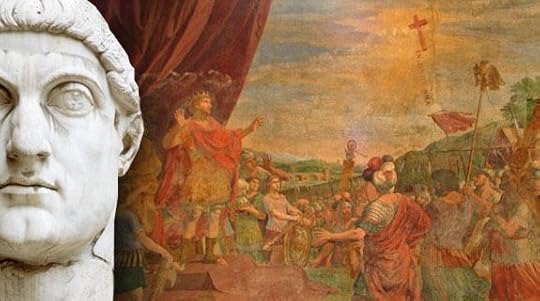
Constantine’s Gift to Christianity | Benjamin Wiker | Catholic World Report
On the anniversary of Constantine’s conversion, we should consider why the West seems to be converting back to paganism.
On October 28, 312, Emperor Constantine met Emperor Maxentius in
battle just outside the city of Rome at the Milvian Bridge, spanning the Tiber.
This battle—occurring exactly 1,700 years ago—is one of the most important
events in the history of Christendom, since it was through Constantine’s
victory that Christendom began. It is a battle well worth reflecting upon.
As is well known, the previous day Constantine experienced a
vision of a cross of light in the sky, with the words “By this sign you shall
conquer” (in Greek, not Latin, by the way). That night, so we are told,
Constantine had a dream wherein he was told to paint the cross on the shields
of his soldiers.
He did. And so it happened, as the vision said.
The next day, October 28, 312, Constantine defeated Maxentius.
Interestingly enough, Maxentius could have stayed within the walls of Rome. He
was plentifully stocked to endure a siege. Inexplicably, he decided to go out
and engage Constantine. His troops were defeated, and Maxentius himself drowned
in the Tiber trying to escape.
Such was the beginning of Constantine’s embrace of Christianity,
and such was the beginning of the transformation of the Roman Empire from
paganism to Christianity.
It is, again, a well-known story, and unfortunately, as with other
well-known stories, it is not well-known enough, or at least, not thought about
deeply enough.
There are, for example, those who take Constantine’s conversion as
the beginning of the end of real Christianity. Christianity, they argue, is the
Christianity of the early Church, the Church before it became favored and hence
entangled with the empire, the pure Church, the Church before Constantine, the Church
of the martyrs.
The problem with this romantic vision of the pure early Church is
that it wasn’t shared by the early Church. We owe it to them to take things,
first of all, from their point of
view.
For some journalists, the only good and interesting nun....
... is a former and now dissenting nun:
For Diane Dougherty, it is a way to live up to her calling and to
challenge the hierarchy of the Catholic Church. It is a hierarchy that
Dougherty maintains is sexist. Though not recognized by the Vatican, the
Coweta County resident and longtime former nun will be ordained next
week and will become the first female Catholic priest in Georgia. (www.TheCitizen.com)
An Atlanta woman, a former nun, is
seeking to change the Roman Catholic Church, realizing that what she
will get her excommunicated from the Church. On Saturday Diane Dougherty is going to be ordained as a priest, not
in the Catholic Church, but in an organization called The Association
of Roman Catholic Women Priests. It is an international organization that the Church condemns. (NBC33TV.com)
A former nun is taking a big leap of faith, preparing to become the first female Catholic priest in Georgia. “I've had a calling and I've known since I've been in the seventh grade,” Diane Dougherty told Channel 2’s Sophia Choi. She'll
be ordained this Sunday at Atlanta’s First Metropolitan Community
Church by the Association of Roman Catholic Women Priests. No
Catholic church will have her, as it goes against the religion. Atlanta
Archbishop Wilton D. Gregory said ordaining women “brings division and
fractures unity in the church.” (WSBtv.com)
A metro Atlanta woman is set to be ordained as Georgia's first female
Catholic priest on Saturday. However, the Roman Catholic Church says she
will be excommunicated because the church doesn't recognize women
priests or the ordination service that she will participate in. Diane
Dougherty says that as a former nun and parochial school teacher, she
is very familiar with the rules of the Roman Catholic Church. The
Association of Roman Catholic Women Priests will ordain her. Dougherty
said that she knows she is about to make both history and enemies. (www.MyFOXAtlanta.com)
And so forth and so on. Of course, the Washington Post published Dougherty's story, which is all victimhood and grievances, with at least five references to the heinious evil of "clericalism". I put it in scare quotes because her definition of clericalism is a bit self-serving. And, at times, quite vague. For instance:
What I felt, but did not have words to describe, was the growing politic
of clericalism creeping throughout the South by the strategic
appointment of bishops and priests.
Oh. This statement sheds a bit more light on the matter:
October 25, 2012
New: "Married Priests? 30 Crucial Questions About Celibacy"
Now available from Ignatius Press:
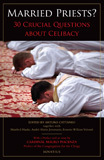 Married Priests? 30 Crucial Questions About Celibacy
Married Priests? 30 Crucial Questions About Celibacy
Edited by Dom Arturo Cattaneo
• Also available as an Electronic Book Download
Why do Catholic priests not marry? How can celibacy possibly be so
important to the Church, if Jesus did not even require it of his
apostles? Cannot such an obligation cause sexual deviance, emotional
troubles and even cases of pedophilia? These are three among the
numerous possible questions that many people ask themselves, often
without finding convincing answers.
In recent years the arguments in favor of openness to married priests
seem to be multiplying. Some object that celibacy is not a dogma but
only a discipline that originated in the Middle Ages; that it is
contrary to nature and hence harmful for a man's psycho-physical
equilibrium and the maturation of the human personality. And then, if
priests could marry, there would be an increase in vocations.
In this book, seventeen various experts make contributions, responding
to these and other burning objections, allowing the reader to discover
the value that celibacy has today in the lives of thousands of priests
and seminarians.
Among the key topics this book discusses are: History of Priestly
Celibacy, What Theology Says on the Celibacy, Emotions and Sexuality,
Discerning and Fostering a Vocation, Celibacy in the Life of a Priest,
Celibacy and Inculturation, Papal teachings on Celibacy from Pius XI to
Benedict XVI.
"I hope that this book will find the widest possible readership, thus
contributing to an ever greater appreciation of priestly celibacy as a
precious gift of the Spirit of Christ to his Church and received by
young men who-like Saint Paul and so many saints-allow themselves to be
"won over by Christ".
From the Preface, Cardinal Mauro Piacenza, Prefect of the Vatican Congregation for the Clergy
Nine new book reviews ...
... courtesy of Homiletic & Pastoral Review:
THE MEANING OF SEX. By Jay Budziszewski (Reviewed by Fr. James Schall, S.J.).
THE SECRET LIFE OF JOHN PAUL II. By Lino Zani with Marilu Simoneschi. (Reviewed by Peter A. Huff).
DOCTRINAL SERMONS ON THE CATECHISM OF THE CATHOLIC CHURCH. By Kenneth Baker, S.J. (Reviewed by Dr. Mitchell Kalpakgian).
THE MODERN AGE. By Fr. James V. Schall, S.J. (Reviewed by David C. Paternostro, S.J.).
WOMEN DEACONS: PAST, PRESENT, AND FUTURE. By Gary Macy, William T. Ditewig, and Phyllis Zagano. (Reviewed by Matthew Chicoine).
THE INNER LIFE OF PRIESTS. By Gerard J. McGlone, S.J., and Len Sperry. (Reviewed by Fr. Kenneth Baker, S.J.).
The Sacrifice and Solace of Sacerdotal Service: Three New Books on Priesthood (Reviewed by Fr. David Vincent Meconi, S.J.), including:
• THE CHARISM OF PRIESTLY CELIBACY: BIBLICAL, THEOLOGICAL, AND PASTORAL REFLECTIONS. Edited by John Cavadini.
• WHY PRIESTS ARE HAPPY: A STUDY OF THE PSYCHOLOGICAL AND SPIRITUAL HEALTH OF PRIESTS. By Fr. Stephen J. Rossetti.
• CALLED BY NAME: TWELVE GUIDELINE MEDITATIONS FOR DIOCESAN PRIESTS. By Fr. Michael E. Giesler
October 24, 2012
20% off books and films for the Feast of All Saints' Day

20% off books and films on Saints' Lives in honor of All Saints Day
| Offer ends Tuesday October 30th, 2012 at 12:00 midnight EST. These prices are available online only through Ignatius.com
Next
Thursday, November 1st is All Saints Day. Ignatius Press is celebrating
this day with 20% off books and films on the lives of St. Thomas
Aquinas, St. Ignatius of Loyola, St. Paul, St. Francis and many more.
Their courageous stories of selfless dedication to God are an
inspiration to all! Choose from any of the books or films listed below
to help yourself grow in love and devotion, all at 20% off!
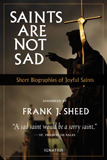 Saints Are Not Sad
Saints Are Not Sad
Frank Sheed
The saints Sheed chose for this collection are from various time
periods. Many are well known, like St. Anthony, Francis, Augustine,
Patrick and Bernadette, while others are lesser known. The same can be
said for the various authors of these short biographies. Among them are
the famous like Hilaire Belloc, Alban Goodier and G.K. Chesterton, as
well as authors whose names may no longer be familiar. Also available as an e-book.
Regular price: $19.95, sale price: $15.96
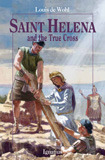 Saint Helena and the True Cross
Saint Helena and the True Cross
Louis de Wohl
Set against the colorful background of power struggles in imperial
Rome and battling Roman legions, this is the exciting story of St.
Helena, mother of the Emperor Constantine, who found the Cross of Christ
in Jerusalem. This book for young people paints a vivid portrait of a
remarkable woman who overcame every obstacle with faith, hope,
perseverance... and a healthy dose of ambition.
Regular price: $9.95, sale price: $7.96
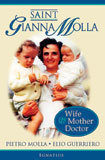 Saint Gianna Molla
Saint Gianna Molla
Pietro Molla
This is the inspiring story of a canonized contemporary woman.
Gianna Molla (1923-1962) risked her life in order to save her unborn
child. A unique story, co-authored by her own husband, with his deeply
moving personal insights of the heroic witness, love, sacrifice and joy
of his saintly wife. Illustrated.
Regular price: $11.95, sale price: $9.56
 Book of All Saints
Book of All Saints
Adrienne von Speyr
Von Speyr had a deep communion with the saints and would see them
while in a state of mystical prayer. Among the long list of saints in
this book are St. John the Apostle, St. Augustine, St. Francis, St.
Thomas Aquinas, St. Ignatius of Loyola, St. Teresa of Avila, St. John of
the Cross, St. John Bosco, St. Bernadette, St. Edith Stein and many
more. Also available as an e-book.
Regular price: $24.95, sale price: $19.96
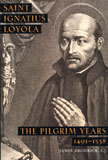 Saint Ignatius of Loyola
Saint Ignatius of Loyola
James Brodrick, S.J.
In this biographical work, Fr. Brodrick combines scholarly
research with a readable style that shows the stages by which God led
the wounded cavalier out of his dream-world of romantic battles into the
noontide of divine reality. Includes maps and index.
Regular price: $16.95, sale price: $13.56
Also on St. Ignatius: The Pilgrims' Journey
Regular price: $16.95, sale price: $13.56
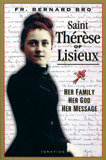 St. Thérèse of Lisieux
St. Thérèse of Lisieux
Fr. Bernard Bro
Fr. Bernard Bro sets forth those aspects of her life, personality,
and writing that mark Thérèse as one of the great exponents of Catholic
doctrine. What she offers in her life and in her writing, he claims, is
"one of the most certain and simplest evangelical shortcuts ever
proposed." Illustrated with photos.
Regular price: $16.95, sale price: $13.56
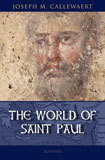 The World of St. Paul
The World of St. Paul
Joseph Callewaert
Joseph Callewaert's engaging work on St. Paul reads like a novel.
With inviting, even dramatic, prose, it recounts the story of the great
Apostle to the Nations. For those who know little about St. Paul—which
includes many Christians—it is a superb introduction. Also available as an e-book and audio download.
Regular price: $16.95, sale price: $13.56
Also on St. Paul: Saint Paul
Regular price: $14.95, sale price: $11.96
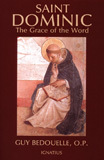 Saint Dominic
Saint Dominic
Guy Bedouelle, O.P.
This book represents the best, most concise and readable spiritual
biography of St. Dominic. The focus of the biography is the way in which
Saint Dominic embodied the role of Christ as preacher and the results
that came from this grace. Also available as an e-book.
Regular price: $16.95, sale price: $13.56
Saint Francis of Assisi
Ivan Gobry
Gobry takes on the task of revealing the real Saint Francis, the
man who abandoned wealth and chose to live a beggar's life.
Regular price: $16.95, sale price: $13.56
Saints for Today
Ivan Innerst
These portraits of twelve saints focus on how each of these heroes
has a specific message significant for those living in our times.
Also available as an e-book.
Regular price: $9.95, sale price: $7.96
A Holy Life
Patricia McEachern
For the first time in English, St. Bernadette's own spiritual
insights: thoughts, advice, sayings, and prayers through the touching
words of her spiritual diary, notes, and letters to friends and family. Also available as an e-book and audio download.
Regular price: $14.95, sale price: $11.96
Catherine of Siena
Sigrid Undset
Undset’s Catherine of Siena is critically acclaimed as
one of the best biographies of this well known, and amazing
fourteenth-century saint. Known for her historical fiction, Undset
based this factual work on primary sources, her own experiences living
in Italy, and her profound understanding of the human heart. Also available as an e-book and audio download.
Regular price: $17.95, sale price: $14.36
Citadel of God
Louis de Wohl
This historical novel tells the dramatic story of St. Benedict, the
father of Western monasticism, who played a major role in the
Christianization of 6th century Europe. Also available as an e-book.
Regular price: $17.95, sale price: $14.36
Fire of Love
José Luis Olaizola
This novel follows the joys and hardships experienced by young Juan
de Yepes Alvarez. Testing Saint John to the utmost were his efforts,
along with those of Saint Teresa of Avila, to reform the Carmelite
Order. Also available as an e-book and audio download.
Regular price: $16.95, sale price: $13.56
Set All Afire
Louis de Wohl
De Wohl takes us into the mind and heart of this great missionary
and saint who went by order of St. Ignatius to "set all afire'' in the
Orient. Also available as an e-book.
Regular price: $16.95, sale price: $13.56
St. Thomas Aquinas & St. Francis of Assisi
G.K. Chesterton
Many consider these biographies the best short portraits ever
written of these saints. St. Francis of Assisi explains and illuminates
the life of St. Francis. St. Thomas Aquinas is enriched by Chesterton's
unique ability to see the world through the saint's eyes.
Regular price: $16.95, sale price: $13.56
The Life of St. Philip Neri
Written by his disciple Antonio Gallonio
"The Apostle of Rome", set in motion a great renewal of faith at
the heart of the Church during the 1500's. This is the first ever
English translation of this book, published originally in the Jubilee
Year 1600. Also available as an e-book.
Regular price: $16.95, sale price: $13.56
Restless Flame
Louis de Wohl
A stirring novel which deals reverently but realistically with the
fascinating life and era of St. Augustine. De Wohl tells the story of
St. Augustine's transformation from a vain, sensual youth to the
brilliant, devout writer, theologian and bishop. Also available as an e-book and audio download.
Regular price: $17.95, sale price: $14.36
Films
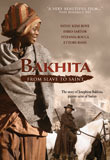 Bakhita
Bakhita
Born in a village in Sudan, kidnapped by slavers, often beaten and
abused, and later sold to Federico Marin, a Venetian merchant, Bakhita
comes to Italy and becomes the nanny servant of Federico's daughter,
Aurora. She is treated as an outcast by the peasants and the other
servants, but Bakhita is kind and generous to others and gradually comes
closer to God. She requests to join the Canossian sisters, but Marin
doesn't want to give her up as his servant, treating her almost as his
property. This leads to a moving court case where she wins the freedom
to follow her vocation.
Regular price: $24.95, sale price: $19.96
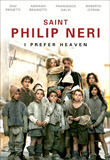 St. Philip Neri
St. Philip Neri
An epic feature film on the famous "Apostle of Rome" and great
friend of youth in the 16th century. One of the most popular saints of
all time, St. Philip Neri was widely known for his great charity, deep
prayer life, and tremendous humor. This captivating film highlights
Neri's great love for youth, his warm sense of humor, contagious joy,
deep mystical spirituality, and his amazing gift for miracles. Actor
Gigi Proietti gives a moving performance as St. Philip in this
beautifully produced film that is directed by Giacomo Campiotti,
director of the acclaimed films Bakhita: From Slave to Saint and St. Giuseppe Moscati.
Regular price: $24.95, sale price: $19.96
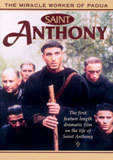 Saint Anthony
Saint Anthony
The first major feature film on the life of St. Anthony of Padua,
starring Daniele Liotti in an acclaimed performance. Made in Italy, this
outstanding film presents St. Anthony as a strong and appealing person
who sacrificed wealth, popularity and family for the Kingdom of God. It
beautifully portrays the power of his preaching, the holiness of his
life, his love for the poor, and the wonders of his miracles.
Regular price: $19.95, sale price: $15.96
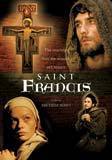 Saint Francis
Saint Francis
Filmed on location in Assisi and other actual locations where St.
Francis lived and died, this feature film vividly tells the story of
this greatly beloved saint from childhood through his death. Beautifully
filmed with outstanding cinematography and fine acting talent, this
film stars Italian actor Raoul Bova as Francis and was directed by the
acclaimed fimmaker, Michele Soavi.
Regular price: $24.95, sale price: $19.96
 Maria Goretti
Maria Goretti
This feature film tells the moving story of St. Maria Goretti, a
virtuous young girl who died protecting her purity, and about her heroic
parents who, despite great hardships, instilled a deep love for God in
their children. Made on location in Italy and filled with authentic
detail.
Regular price: $19.95, sale price: $15.96
 Saint Rita
Saint Rita
Famous as the patron of hopeless situations, St. Rita of Cascia is
immortalized in this powerful feature film. Starring Vittoria Belvedere
and Martin Crewes, this is the story of a brave woman who married her
knight, helped him overcome his dark past and convert to the faith, bore
him two children, only to lose everything in her life. She finds peace
in a convent of sisters, and develops a deep union with Christ.
Regular price: $24.95, sale price: $19.96
Clare and Francis
From the producers of Padre Pio and St. John Bosco
comes this beautiful epic feature film on the lives of St. Clare and
St. Francis of Assisi. Shot on location in Italy, stars Mary Petruolo
and Ettore Bassi give inspiring, authentic performances as Clare, the
daughter of a patrician family, and Francis, the son of a rich merchant,
who leave all to follow Christ. The definitive film on these great
saints.
Regular price: $24.95, sale price: $19.96
St. Giuseppe Moscati
Giuseppe Moscati, "the holy physician of Naples," was a medical
doctor and layman in the early 20th century who came from an
aristocratic family and devoted his medical career to serving the poor.
In this beautifully filmed movie, learn the story of one of the great
modern saints—almost unknown in America.
Regular price: $24.95, sale price: $19.96
St. John Bosco: Mission to Love
Flavio Insinna gives a winning performance as John (Don) Bosco, the
great priest and educator of youth from the tough streets of Turin,
Italy. Beautifully filmed in Italy, this epic movie dramatizes the many
challenges that Don Bosco had to overcome. His deep faith, creative
imagination and profound charity shine through in this wonderful film.
Regular price: $24.95, sale price: $19.96
St. John Baptist de La Salle
The inspiring story of a 17th century French priest who
reluctantly became involved in educating poor children and became the
Founder of the Brothers of the Christian Schools, an order known today
as the De La Salle Christian Brothers. Actor Mel Ferrer gives a
heartfelt performance as St. John Baptist de La Salle, a priest from a
wealthy upper-class family who gave up everything to serve the needs of
educating poor children, facing tremendous opposition along the way.
Regular price: $19.95, sale price: $15.96
Loopers, Life, and Love

Loopers, Life, and Love | Carl E. Olson | Catholic World Report
The movie “Looper” has time traveling and assassins, but also philosophical and moral depth.
Two weekends ago, I went to the movie theater for the fourth
time this year, which means I've already doubled my in-the-cineplex movie
intake over last year. I certainly like movies, but have, in recent years,
spent more time following various television series, which have the advantage
of being able to unfold (or unravel, in some sad cases) over the course of
several years. That said, certain premises capture my attention, and the set-up
for "Looper" is one of those: a time travel flick with a dose or two
of philosophical musing and inference mixed in among the obligatory explosions,
killing, tussles, chases, and special effects.
(Warning: Major Spoilers Ahead! Repeat: Major Spoilers
Ahead!)
First, the downside: "Looper", the third film by
talented writer and director Rian Craig Johnson, is quite violent and
occasionally vulgar, and sometimes in a way that is simply gratuitous. This is
unfortunate, as the gore and language (and one scene with nudity) sometimes
detract and distract from a movie that is propulsive, gripping, and, as it
builds to a gripping conclusion, quite poignant. It succeeds as both an
"action flick" and a morality play of sorts, even if the latter only
emerges through a series of intermittent, but hardly random, instances of
reflective dialogue borne along by exceptional cinematic storytelling.
"Looper" has its share of carnage, but it is rarely crude; in fact, I
think it can be plausibly argued that the intense violence is intended to
inform and set in relief the deeper moral form of the film.
Of course, I'm also the same moviegoer who thought (and
still thinks) that "Kill Bill, Part Two" is a
(gasp!) pro-life movie, whether or not Quentin Tarantino intended such a
thing. So, take it with a grain of salt. Or with an entire salt lick, if you
wish. Still, I am quite happy to present my argument for "Looper" as
a morality play with some worthwhile things to say—or, better, reveal in
cinematic fashion—about free will, authentic love, the power of motherhood (and
fatherhood, for that matter), and the nature of evil.
Carl E. Olson's Blog
- Carl E. Olson's profile
- 20 followers



